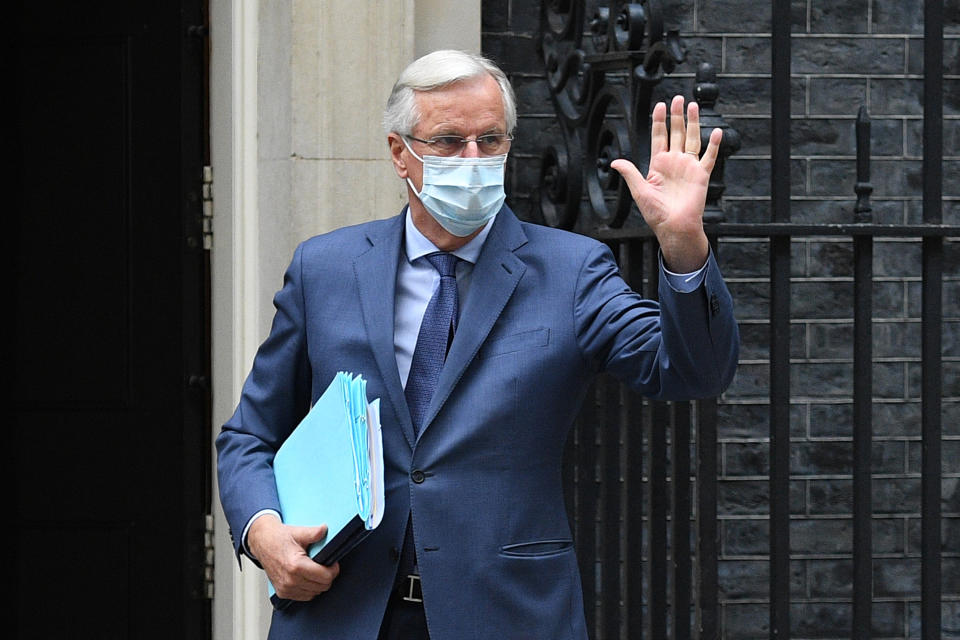Intensified talks with EU fail to break Brexit deadlock

The second week of “intensified” negotiations with the EU has failed to break the Brexit deadlock, with the bloc’s chief negotiator warning on Thursday that “significant divergences remain” between both sides.
The scant progress comes in spite of the UK and EU agreeing to step up the pace of discussions in recent weeks, following five previous rounds of ill-fated trade negotiations.
Michel Barnier said on Twitter that this week’s discussions, which took place at Downing Street in London, confirmed his previous assessment that there were significant differences between both sides.
He said, however, that the EU would continue to participate in negotiations with “patience, respect and determination.”
Talks held in Brussels last week also failed to yield any substantive progress on the major issues up for negotiation, including on trade and financial services.
“Negotiations so far have shown little progress,” the European Commission said in a Thursday communique to the European Parliament and EU leaders.
This week’s discussions confirm that significant divergences remain between 🇪🇺 & 🇬🇧. We will continue working with patience, respect & determination.
Regardless of the outcome, there will be inevitable changes on 1/1/21. Read more here 👇https://t.co/CzbGX7VGQY— Michel Barnier (@MichelBarnier) July 9, 2020
The communique outlines the “inevitable disruptions” that will occur after the Brexit transition period ends on 1 January even if a trade agreement is reached, referencing the imposition of customs checks, trade in services, and changes to travel arrangements, among other things.
READ MORE: John Lewis to close eight stores, risking 1,300 jobs
“It is essential that all stakeholders be made aware of this, and that they ensure their readiness for these broad and far-reaching changes, which will arise under any scenario, regardless of the outcome of negotiations between the European Union and the United Kingdom,” the commission said.
Prime minister Boris Johnson and his EU counterpart Ursula von der Leyen held a high-level meeting in June, aimed at establishing common ground to break the deadlock.
Following that meeting, the UK said that both sides had agreed that “new momentum” was required.
“They supported the plans agreed by chief negotiators to intensify the talks in July and to create the most conducive conditions for concluding and ratifying a deal before the end of 2020,” Downing Street said.
But the failure of this week’s talks further raises the prospect of a crash-out exit from the current transition arrangements, which will see EU laws remain in place until the end of the year.
Both sides have until then to agree to a trade deal, a timetable experts say is almost unheard of.
The deadline for an agreement of an extension to the negotiating timetable passed last week, meaning that, unless a deal is agreed, the UK will leave the transition period without a trade accord.
READ MORE: UK chancellor warns of 'difficult' choices on public finances
Downing Street said on Tuesday that Johnson had told German chancellor Angela Merkel in a phone conversation that the UK would be ready to leave the EU “on Australia terms.”
But Australia has not signed a so-called comprehensive trade agreement with the EU, and mainly trades with the bloc on default World Trade Organisation terms.
The country has negotiated discrete agreements for certain types of goods, and is actually pushing for a fuller trade agreement. A seventh round of trade negotiations between the EU and Australia concluded in May.
“Discussions were held in a good and constructive atmosphere and showed a shared commitment to negotiate an ambitious and comprehensive agreement,” the commission said last month in a progress report.

 Yahoo Finance
Yahoo Finance 
